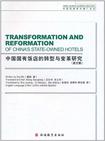中国国有饭店的转型与变革研究
2011-7
旅游教育出版社
戴斌
397
王向宁^束菊萍^徐明宇^摆志靖
中国首都机场集团饭店产业重组与拓展(2002)等一系列课题中,对中国国有饭店的形成、发展、运行机制、制约因素、创新实践和发展前景等问题,进行了系统的考察和研究,并在借鉴新制度经济学、组织行为与组织变革、国有企业改革和国际饭店管理等相关理论的基础上,试图从理论上回答诸如“为什么在中国在竞争性的饭店领域选择了国家所有制?”;“为什么在市场经济条件下国有饭店摆脱不了低效率运行的状态?”;“哪一种模式才是中国饭店产业创新的收益最大的选择?”;“国有饭店的转型与变革过程中的难点有哪些?如何解决?”之类的问题。正是对这些问题的相对系统的回答,构成了由戴斌编著的《中国国有饭店的转型与变革研究》一书的核心内容。本书是《中国国有饭店的转型与变革研究》英文版。
戴斌(1967—),经济学博士,北京第二外国语学院旅游管理学院教授,全国旅游饭店星评委国家级检查员。担任《中国旅游饭店》等专业刊物编委,多家大型饭店管理顾问和独立董事。公开发表相关论文170余篇,出版专著、译著和教材10余部,主持各级各类研究课题30余项。2004年入选“北京市拔尖创新人才百人计划”。
Chapter 1 Introduction
1. Research Background
2. Theoretical Framework and Methodology
3. Research Structure and Major Findings
Chapter 2 China's State-owned Hotel Industry in the Market-oriented
Reform Course
1. State-owned Hotels: Analysis on Initial Situation under a
Threedimension Structure
2. The Logical Course of SOHs' Market-oriented Reforms
3. History of SOHs' Market-oriented Reform Course
4. Evolution of SOHs' Target in the Market Process
5. The Culture and Economic Impact of SOHs
Chapter 3 Environment Analysis on China's State-owned Hotel
Development
1. Trends and Influences of Institutional Environment
2. Changes and Influences of Market Environment and Industrial
Relations
3. A Survey of Employees on Their Orientation towards Reform
Chapter 4 State-owned Hotel Transformation: Model and Theoretical
Framework
1. Initial Target Defining of State-owned Hotels from the
Viewpoint of Contributing Factors
2. Motivation Mechanism of State-owned Hotels Transformation from
the Viewpoint of Environmental Changes
3. The Nature and Objectives of State-owned Hotel Transformation
4. Analysis on Macro-Approaches to State-owned Hotel
Transformation
Chapter 5 A Comparative Study on the International State-owned
Hotel Transformations
1. Process of Hospitality Industry Development in
DevelopedCountries and Areas
2. Transition, Transformation and Reformation of Hotels in
Developing Countries
3. Analysis on Developing Features and Supporting Factors of
Internationa Hotel Groups
Chapter 6 A Theory and Transformation of Domestic State-owned
Hotels
1. Industrial Fluctuation Theory in Institutional Transformation
of State-owned Hotels
2. A Study on Transformation Model Involving Property Right
Transition
3. A Study on Transformation Model without Property Right
Chapter 7 Institutional Innovation in China's State-owned Hotel
Transformation
1. A Study on Property Right Arrangement and Innovation of
State-owned Hotels
2. Corporate Governance and Innovation of State-owned Hotels
3. A Study on Competitive and Cooperative Framework of
State-owned Hotels
Chapter 8 Transformation Tactics of China's State-owned Hotels
& Their Organizational Changes
1. Transformation Tactics of Government Reception Hotels
2. Transformation Tactics of Hotels Owned by Giant State-owned
Enterprises
3. A Study on Organizational Changes of State-owned Hotels
Chapter 9 Case Study: Transformation of the Dongying Hotel(I)
1. Background
2. The Introduction of Reform Signals
3. Reform Goal and Plan
4. Organizational Development——Behavioral Regulation
Chapter 10 Case Study: Transformation of the Dongying Hotel(Ⅱ)
1. Organizational Transformation——Product Innovation
2. Organizational Transformation——Structural Adjustment
3. Organizational Transformation——Rebuilding the Incentive and
ControllingSystem
4. Institutional Transformation to Be Accomplished
Appendix
Appendix 1 Questionnaire to State-owned Hotel Leaders
Appendix 2 Questionnaire to Staff in Functional Departments in
the Dongying Hotel
Appendix 3 Questionnaire to Front Office Staff in Dongying Hotel
Acknowledgement
版权页:插图:The existence of hotel management is based on the social division of labor and the division of labor inside hotels. The nature of it is the coordination, instruction,incentive and restriction of relationships between people through " that harmony in management brings higher productivity, lower cost and higher profits than the harmony in market," " the management of people" also means the study of customers. The Chinese hotel market is in the course of transformation from focusing on inbound tourists to more on domestic tourists. Compared with foreign tourists, there are historical and cultural background differences with domestic tourists in terms of consumption patterns,consumption characteristics and expected value for hotel products. It requires the hotel managers of the 21st century to make efforts to research the consumption patterns of domestic tourists, and commit themselves to the innovation of products, market and hotel organization systems. However, the emphasis on the management of " people" does not mean that managers should not pay attention to the management of " work". Instead, the management of "work" can be achieved through the management of "people". During the transfer of management objectives from " work " to " people ",management tools of SOHs are also experiencing a change from " experience" to"rationalism". Only when management acknowledges the scientific management moderat her than relying on the experience of managers can the level of management be improved and can push management into productivity. Hotel management knowledge can be represented through scientific and rational management modes. If we always semphasize that hotel management is an "art" which can only be improved by dependingon the accumulation of a manager's experience, then our level will never reach that of the western countries with a developed tourism industry.
《中国国有饭店的转型与变革研究(英文版)》是中国旅游学术推广文丛之一。
